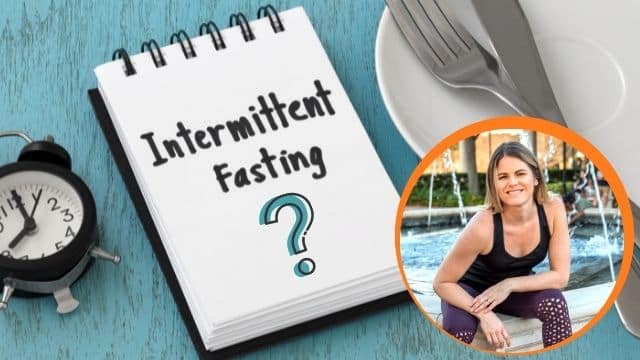Today, we are going to go into whether or not Intermittent Fasting (IF) is a feasible diet strategy, some of its benefits and pitfalls, and if it’s a good strategy for YOU.
Let me start by saying that I am not necessarily an advocate for IF, nor am I against it. By reading this post, it should be clear what my opinion is.
What is Intermittent Fasting?
Basically, Intermittent Fasting (IF) is when you fast (consume close to nothing but water) for a determined period of time. Some say coffee with a little bit of milk is ok, others say keep it to water. Either way, they all involve relatively brief intermittent or random periods of not eating.
As you can see on this chart below, there are many different ways that people approach IF. Some IF advocates believe that random is the best way to go. Their beliefs are that we should behave as our evolutionary ancestors did, as humans evolved getting their food and exercise randomly, so should we. Then again, there are some other schedules as you can see here:

Is IF a feasible weight loss method?
Studies have confirmed that it is effective to practice IF for weight loss.
Example:
In a study by the University of Otago in New Zealand, 250 people who were classified as “overweight” or “obese” selected one of the following diet approaches: IF, Mediterranean diet, or a modified Paleo diet. The study was a year long.

And now, I have a very exclusive secret for you, about why IF works.
When you practice IF, typically your overall calorie consumption decreases which cause an energy deficit, which leads to weight loss. Wow!
There are different ways you can approach creating this calorie deficit, and IF is one of them.
Potential Benefits of Intermittent Fasting
- Regulating blood glucose
- Controlling blood lipids
- Reducing the risk of cancer
- Managing body weight
- Reducing the risk of coronary disease
However, I do want you to know that these benefits are not likely to be experienced by everyone… just some people. Most of the research to date has been done using animal models. It is also worth knowing that a lot of the research has been compared to a “normal western diet”. That’s not a great benchmark for comparison, as we don’t have a control group that’s eating a predominantly healthy diet to begin with. There are also some potential alternative reasons in these studies for those benefits. Perhaps they are just due to the weight loss itself (not the method), or eating a diet lower in processed foods, chemicals, and pollutants.
IF Disadvantages
Some of IF disadvantages are more obvious than others. One of the obvious ones is getting “hangry”, and how that affects your mood. You might have massive cravings, stomach rumblings, and mental side effects. Keeping yourself from eating can be really psychologically challenging depending on how long you are fasting.
Longer fasts (>36h) can also harm muscle health and performance, as well as negatively affect nutrient intake.
For example: if you are fasting a longer duration or if you are doing a lot of training (let’s say you are training for a half-marathon) you’re going to need those nutrients to maintain muscle mass. Your body needs proteins and nutrients to build and maintain body tissue. Therefore a longer fast, regardless of your activity level, can be detrimental. So you need to be careful with longer fasts, greater than 36h.
It is also worth noting that when you eat less of everything, you also eat fewer vitamins and minerals, and beneficial phytonutrients. You’ll want to make sure you are eating nutrient dense foods, and perhaps consider a quality multivitamin supplement.
Will IF work for you?
IF may have some benefits for health, longevity, and fat loss, but should be done judiciously.
One reason for women, in particular, is that women are more sensitive to hormonal changes when fasting. This is worth consideration especially when you are trying to get pregnant, are pregnant, or have thyroid issues. If you do choose to try Intermittent Fasting, be careful. Pay attention to what your body is telling you and how are you feeling.
IF is a great way to:
- learn the difference between head hunger and body hunger (whether you are actually hungry, or just having a craving)
- improve insulin sensitivity and re-calibrate your body’s use of stored fuel
- learn more about your own body and relationship with food
- lose fat, if you go about it carefully
- take a break from the work of food prep and the obligation to eat
Not great for:
- people with a history of disordered eating
- pregnant or breastfeeding women (it’s probably not great for women trying to get pregnant, either)
- children, adolescents, and elderly people
- people exercising often and intensely
- people who need a consistently higher energy intake every day (such as people doing heavy manual labor)
- people with a lot of other physical, psychological, and/or life stressors
- Type 1 diabetics
- people who need food to take medications
Quick-fix or long-term strategy?
When it comes to eating, there is no finish line. When your diet plan “ends”, where does that leave you? Well, it’s likely that your going to gain that weight back if you don’t change your lifestyle.
Dieting methods that require rigid adherence, more often than not, result in abandonment. “f*$#%$ this, I’m, done!”
But ultimately, fasting is a “nice-to-have”. It’s unnecessary to get in shape, and alone is insufficient. Do you know what’s both necessary and sufficient?
- Fresh, unprocessed, nutrient-dense food is a must, regardless of which eating style you adopt
- eating in the right amounts at the right times
- learning to prepare healthy food in the first place
Learn the essentials of good nutrition. It’s by far the best thing you can do for your health and fitness.
So regardless of whether you try IF or not, you need to be able to adopt a good baseline as far as practicing good nutrition and fitness and overall wellness practices.
If you want to know what fasting strategy is best for you, take the personal assessment! https://tinyurl.com/caitlinIFquiz
I want to make you my next transformation story, so check out my Healthy Lifestyle Programs.
Thanks for reading!




